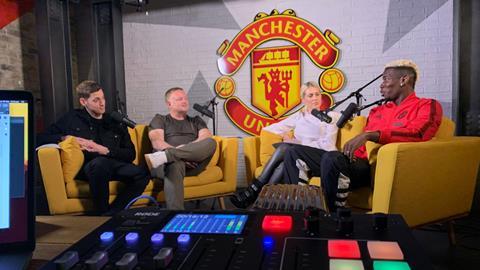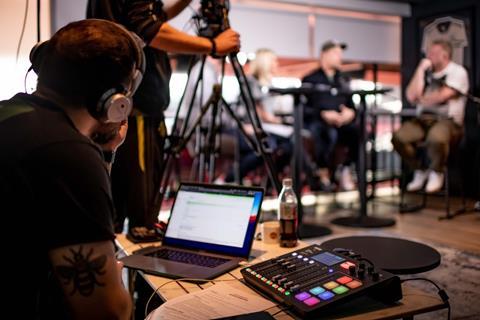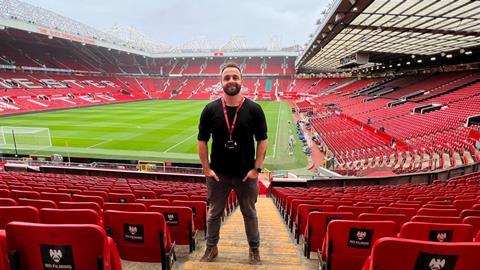Matt Tasker, now executive producer at the Sport Social Podcast Network, reveals how teams such as Manchester United and Aston Villa approach content

When I launched the Manchester United Podcast back in 2019 as part of the internal content team; I knew it was a rare opportunity, not just to represent one of the most iconic football clubs in the world, but to do so in a way that felt fresh, authentic and fan-first. Within a year, we’d built something big enough to entice Sir Alex Ferguson into an hour-long sit-down. Paul Pogba started a war of words with Graeme Souness. Marcus Rashford opened up about his off-the-pitch activism. Wayne Rooney cleared the air on the Manchester City rumours. That kind of access doesn’t come without trust and trust isn’t built by playing it safe.
Now, as the executive producer at Sport Social Podcast Network, I lead production across a portfolio of rights holder content across the Premier League and beyond, using those same principles to help clubs create standout shows that build fan engagement, unlock deeper narratives, and support broader content strategies.
Here’s what I learned along the way - and the insights we bring to every club podcast we produce at Sport Social.
1. Be brave with the content
Football clubs are, understandably, cautious about the stories they put out. Every quote becomes a headline. Every interview could be twisted out of context. The default position is often to keep things “safe”; content that’s positive, polished, and inoffensive.
But the best stories aren’t always comfortable. In fact, the moment we knew we had something different on our hands was when we discussed covering the fall-out between Sir Alex Ferguson and Roy Keane a moment in club history that’s still sensitive even now. We weren’t trying to stir the pot, but we knew fans wanted to understand what really happened, from the people who were in the room.
That kind of honesty is rare in official channels, but it’s exactly what sets a great podcast apart from a PR vehicle. Finding the balance between the goals of the Communications team and the creativity of the Content team is a delicate line to tread but it’s also the sweet spot for engaging a global fanbase.
By leaning into the difficult moments like the bust-ups, the regrets, the big decisions, we gave the audience something real. And they rewarded us with their time and ears.
Creating that space for real storytelling led to some shocking moments, big laughs, and even tears. When we spoke to former United midfielder Ander Herrera, he broke down midway through the episode and we had to pause recording so he could gather himself. That kind of emotional honesty doesn’t come from asking safe questions, it comes from earning trust.
2. Get the players’ buy-in
Most footballers don’t love doing media. And who can blame them? They’re trained to be cautious, to avoid controversy, and to get through interviews without putting a foot wrong. The result is often a string of generic answers that don’t reflect the personality behind the player.
So we flipped the approach. We didn’t lead with weekend’s result or “the mood in the dressing room”. We asked about childhood, family, setbacks, passions. We gave them room to talk about their lives, not just their performances. Slowly, it worked.

We also made the podcast visible. Literally. We broadcast previous episodes on the TVs at Carrington Training Centre, so the squad would see the format, the tone, the chemistry between guests and hosts. Conversations started in the dressing room.
Curiosity turned into interest. Eventually, players started coming to us with things they wanted to talk about; personal stories, challenges they’d faced, topics they’d never had a proper platform to explore.
That shift from wary participants to active contributors was one of the biggest markers of success.
3. Think beyond the audio
A podcast isn’t just an mp3 file tucked away on a feed. When done right, it is a storytelling engine. One 45-minute episode can feed multiple platforms across the club; MUTV, the website, the matchday programme, the club magazine, social media channels.
Because the podcast environment encourages honesty and longform discussion, it’s often where the most quotable, meaningful moments come from. A player might reveal a formative coach, a teammate’s impact, a moment that changed them. These aren’t soundbites, they’re stories and stories are what fans connect to.
Understanding the wider editorial ecosystem of the club helped us elevate each episode beyond its own runtime. It meant our work had value not just as a standalone show, but as a pillar of Manchester United’s wider content strategy.
Final thought
Launching the official Manchester United Podcast was never just about filling airtime or chasing listens. It was about building a space where players, past and present, could speak openly and where fans could hear something deeper than a post-match interview.
It taught me that bravery, trust and storytelling still matter, even (or especially) when you’re working within the walls of a club as big and carefully managed as Manchester United.
These are the fundamentals of creating official content that has an authentic voice, engages fans and builds audience.
When you get it right, even Sir Alex will say yes to the mic.

Matt Tasker is executive producer at the Sport Social Podcast Network





No comments yet